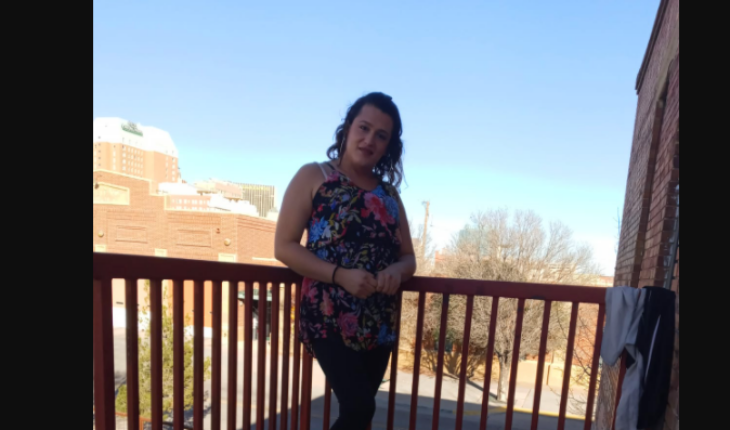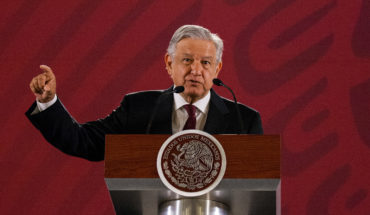It took more than ten years of deportations, fear, living on the streets and practicing sex work for Tiffany, of Honduran origin, to fulfill her two dreams: to transition as a woman and to reach the United States.
“I wanted people to see me, I wanted to be who I am now, a trans woman… The first time I went out I was 16 years old, in 2011. I am from a place where the Mara predominates and I was already experimenting, I already knew that I liked men. I secretly dressed in my mom and sister’s clothes, I put on makeup,” she says.
Although she was hiding, Tiffany was discovered by her mother, who beat her, which caused her to flee her home and her country.
Read: Trans activist Natalia Lane stabbed in Mexico City
Along the way she began to dress as a woman for the first time. Her first circle of support was Guatemala’s trans sex workers. “They start putting on makeup and with them I put on a pair of heels for the first time. I went out with a skirt to the street, I brought brassiere… I felt that I wanted to eat the world! Even though I couldn’t even walk,” Tiffany says with a smile.
He hesitates a little, and immediately recognizes that the whole route he did, he did it without a weight. “Doing sex work with trailers, that’s my way.”
After several months of transit, he managed to reach Tenosique, Tabasco, where he lived for about four years, waiting to get documents that would allow him to remain legally in Mexico, but he did not succeed. Instead, she was sent back to Honduras by authorities, despite the risk she was in.
According to the United Nations Human Rights Committee, between 2009 and 2020 there were 335 violent deaths of lesbian, gay, bisexual and transgender people in Honduras, of which 109 occurred in the last three years.
The United Nations has documented that victims identified as part of the LGBTI community share traits such as obvious signs of torture or punishment, rape, blows to the face, burns, wounds in different parts of the body and deaths caused by firearms.
“My illusions began to die in the street”
“I suffered a lot of discrimination from my family. The town where I’m from was pure scumbag, pure marero -members of the Mara Salvatrucha gang-. I spent a year in Honduras back, a lot of things happened to me. Overnight I had to run away again,” he recalls.
Being a trans woman, “I had to be with the gangsters, although they are homophobic. I had sex with them out of fear, but one of them looked for me whenever I was taken. I lived with a friend and I was studying cosmetology, I was already working on an aesthetic.”
According to Human Rights Watch (HRW), violence against LGBT people in Honduras is associated with economic factors that lead to systematic marginalization that often begins with rejection and abuse by their families.
In a 2020 report, HRW noted that discrimination in education and employment on the basis of sexual orientation and gender identity exacerbates economic marginalization, eventually leaving many LGBT people without stable livelihoods and with few options other than low-income neighborhoods, often controlled by gangs.
This was the case of Tiffany, who lived in fear, until the day when she could no longer bear the insults that the “marero” who was looking for her shouted at her.
“My anger was so much, because I already had to endure that I didn’t like it, and then he wanted to continue humiliating me… I couldn’t stand it and vulgarly replied that he was more fucking than me, because after eating the tiger he was afraid of leather, “he details.
He immediately felt the blow of the bottle of alcohol that his assailant was holding against his face, and began to bleed. He ran out and had no extra time but to take his makeup bag and leave the room he rented. He slept in another house that night and the next morning crossed the border back into Guatemala.
This time Tiffany did not want to cross through Tabasco, and preferred to try her luck in Tapachula, Chiapas. It was June 2019 and the city was saturated due to the entry of a migrant caravan. There was no place in the shelters and the migration services were overwhelmed.
“He was still carrying the wounds from the glass. I went to human rights and told them my story. I was channeled to the UNHCR (United Nations High Commissioner for Refugees) and COMAR (Mexican Commission for Refugee Aid),” where their process again stalled.
Until an afternoon in which she was seen by an acquaintance from Honduras in Tapachula, who told social networks that he had found her in Mexico. He immediately received messages from his sister. warning him that in his village it was already known where he was.
“I submitted the Whatsapp messages to COMAR and they gave me a transfer to Mexico City. For a moment I felt hopeful because I had advanced beyond Chiapas but my life was hell… the hardest part was about to begin.”
With no support networks or papers to work with, upon arriving in Mexico City, Tiffany found herself needing to return to sex work.
“I was just looking for a place to dress as a woman, to have a normal job… the life I always dreamed of, but I made the mistake of giving my papers to keep one of the “madrotas” -in charge of the sex work points-. She disappeared one day with my things. I didn’t see her again.”
The time in which Tiffany was in Mexico City coincided with the beginning of the COVID pandemic, which further complicated her situation: “customers went down a lot, they were cigars that consumed stone or glass … there were no longer people who wanted to pay for sexual services, at most, they asked you to buy some drug and offered to share it in exchange for company.”
“I started using drugs and in the blink of an eye my life changed. I no longer had to pay for hotel. All the illusions with which I came began to die in the street. My immigration papers did not come out and I was sinking more and more into prostitution,” she laments.
Trans sorority crosses borders
“It’s nice to laugh when you’re already here, but don’t believe, when you’re living it you’re only afraid of the things that can happen,” laughs Tiffany, who is currently in Texas, United States, after an affair that took months, and could be possible thanks to the support of other trans women.
The first to reach out to her was Victoria, who coordinates an organization called LLeca-Escucha la calle. Every Tuesday, accompanied by volunteers, she goes to the Monument to the Revolution at night, to give food and clothes to women who practice sex work.
“That’s where I met Victoria, who gave us food and clothes. Pretend that in Revolution they are trained as 100 sex workers, some entaconadas or barefoot, all with their wigs, in lingerie or dressed, but they are formed by a taco”. Gradually their relationship began to be closer.
Victoria’s help, she says, was crucial to getting her out of sex work and drug use. Of her own volition she went to a detoxification center and was hospitalized for three months, in which she recovered, until the day she left and a few hours later she was informed by phone that one of her friends, who was attached with her, had died.
“It’s no excuse, but it’s something I don’t get over to this day. After that I started drinking, I relapsed, but Victoria and other girls at work told me it had to be worth the effort I had made.” But what definitely made her decide she no longer wanted that life was witnessing the attack on one of her companions by a madrota. He got Victoria’s direction, and without invitation, he came to knock on her door.
That night, Victoria recalls, “we didn’t even expect her. Since she arrived I invited her to come, she sat down for cereal dinner and suddenly a taxi driver knocked on the door to ask about her because she had not paid.”
Tiffany laughs and admits that she had no way to pay, that she actually went with Victoria because she had no money to buy something to eat, let alone rent a room to sleep in.
Victoria lives in a two-bedroom apartment, in which since the pandemic began she has been housing sex workers who are homeless, and since that day she was one of her guests. However, unlike her companions, she had to live locked up, fearing that they could do something to her because she had witnessed the aggression against her partner.
While Victoria’s other guests repaid her support by going with her to leave food for sex workers or wearing clothes, Tiffany helped with household chores and food preparation. She was safe as long as she didn’t leave the apartment, but it wasn’t long before she decided she didn’t want to live like this anymore.
She got a friend who lives in the United States to send her money to try to cross the border and, as soon as she had it in her hands, she paid her ticket to Reynosa, Tamaulipas, where a ‘coyote’ was already waiting for her to take her to Texas.
“Unfortunately after they crossed me, already in Texas, they put me in a patrol car and returned me by the border bridge. The migration man told us “Welcome to Mexico” and at that moment I burst into tears, knelt down and shouted. I felt like the world was coming at me,” she says.
He had the money counted and had days without eating. Still with wet clothes from having crossed the river, and from vIn Mexico, Tiffany thought her only option would be to return to the capital and engage in sex work. Victoria sent him 200 pesos to buy food. With what was left over, he remembers that he paid an hour of service in an internet café.
“I went to the internet café and crying I told a friend who lives in New York that I had been returned, that I was wrong and did not know what to do. She gave me Mom Susan’s number. She told me to explain the truth of what was going on and she was going to help me without thinking.”
And that’s how she established contact with the director of the Casa de Colores shelter, which supports trans migrant women to arrive in Texas, United States, in search of better living and security conditions, in cases where they are victims of threats and persecution.
“Let it be what God wants”
The night we conducted the interview, Tiffany is again packing her bags. The next morning, she has a flight scheduled to travel from Texas to California, where members of Translatina, another association that supports migrants, are waiting for her, who will provide her with accommodation and support her to look for educational and employment offers.
Between laughs he shows a lipstick, a palette of shadows and a mascara that he took from Victoria’s house when he left for Reynosa. “I arrived only with the clothes on, the only thing I brought was the makeup on the brassiere so I could touch up wherever I went.”
Getting to Ciudad Juarez – where the border crossing where Susana and Casa de Colores could help her was located – was not easy either. Victoria and her friends in the capital raised just enough money for her to buy the bus ticket and she had to go more than a day without food.
After years, he was finally able to cross into the United States, thanks to the fact that Casa de Colores has an exception to Title 42, a regulation established by the government of former President Trump to expel migrants from its territory. She was received in a home where the first thing she was told was to choose the clothes and shoes she wanted, which she now carries with her to her new life.
“I’ve been doing sex work for many years. Now I have the opportunity to be here, and the truth is that I still don’t know where I’m going, but I’m sure many doors will open for me. I want to study English and something else so I don’t have to work on the same thing again,” he confesses.
Now that she is safe in another country, she only hopes “that it will be whatEver God wants.”
What we do at Animal Político requires professional journalists, teamwork, dialogue with readers and something very important: independence. You can help us keep going. Be part of the team.
Subscribe to Animal Político, receive benefits and support free journalism.#YoSoyAnimal





